ACC3004 Tax Law Individual Assignment - Case Studies
VerifiedAdded on 2022/11/24
|7
|1277
|152
Homework Assignment
AI Summary
This assignment solution addresses key concepts in Australian tax law, focusing on residency, source of income, and dividend taxation. The first part of the assignment examines the different tests for determining Australian residency, including the reside test, domicile test, 183-day test, and superannuation fund test, applying these to a case study involving an individual working in China. The second part explores the importance of determining the source of income for tax purposes, referencing relevant legislation and case law. Finally, the assignment analyzes the taxation of dividends for non-residents, differentiating between franked and unfranked dividends and discussing relevant tax implications. The solution incorporates case law and legislation to support the analysis and provide a comprehensive understanding of the topics covered.
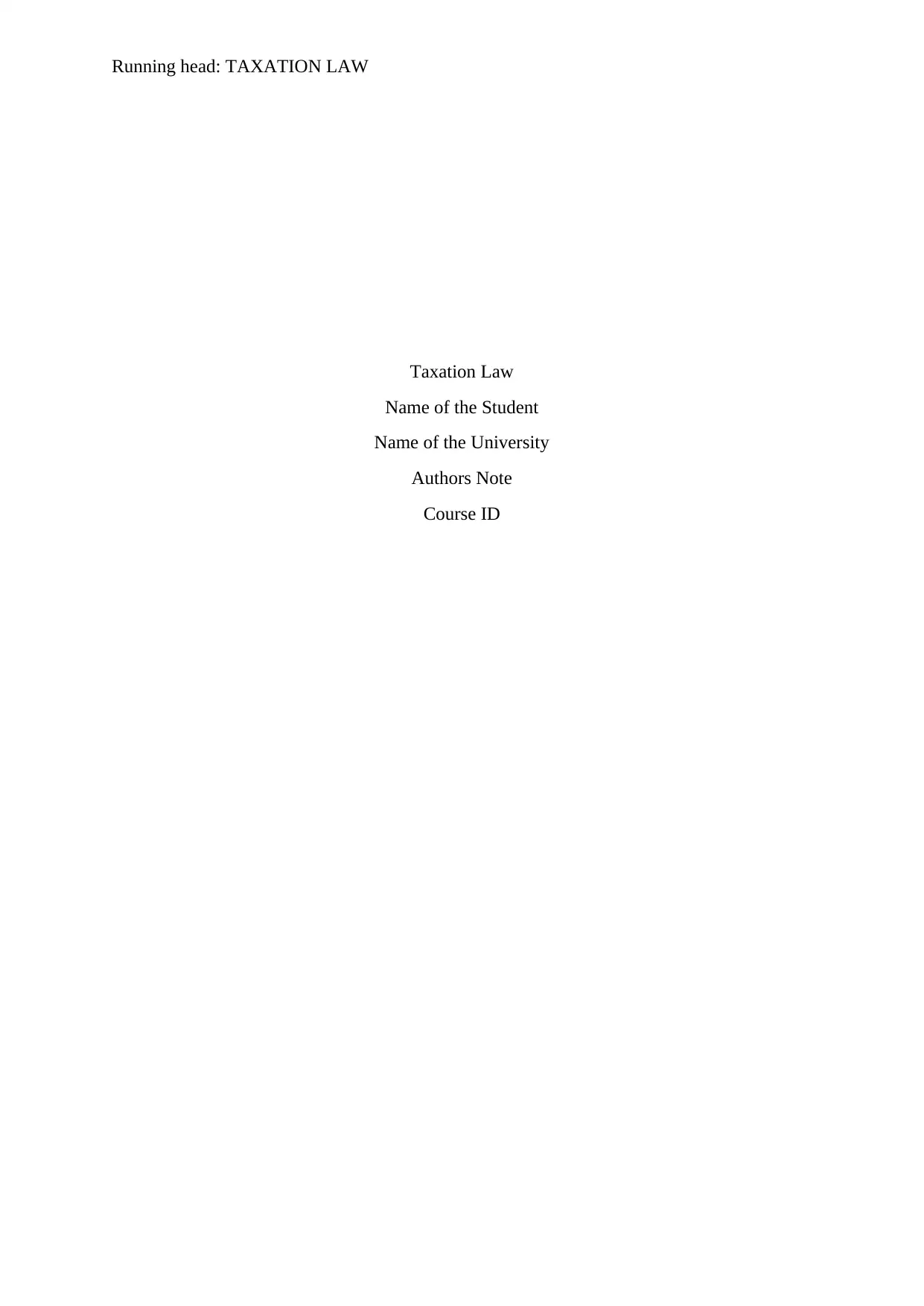
Running head: TAXATION LAW
Taxation Law
Name of the Student
Name of the University
Authors Note
Course ID
Taxation Law
Name of the Student
Name of the University
Authors Note
Course ID
Paraphrase This Document
Need a fresh take? Get an instant paraphrase of this document with our AI Paraphraser
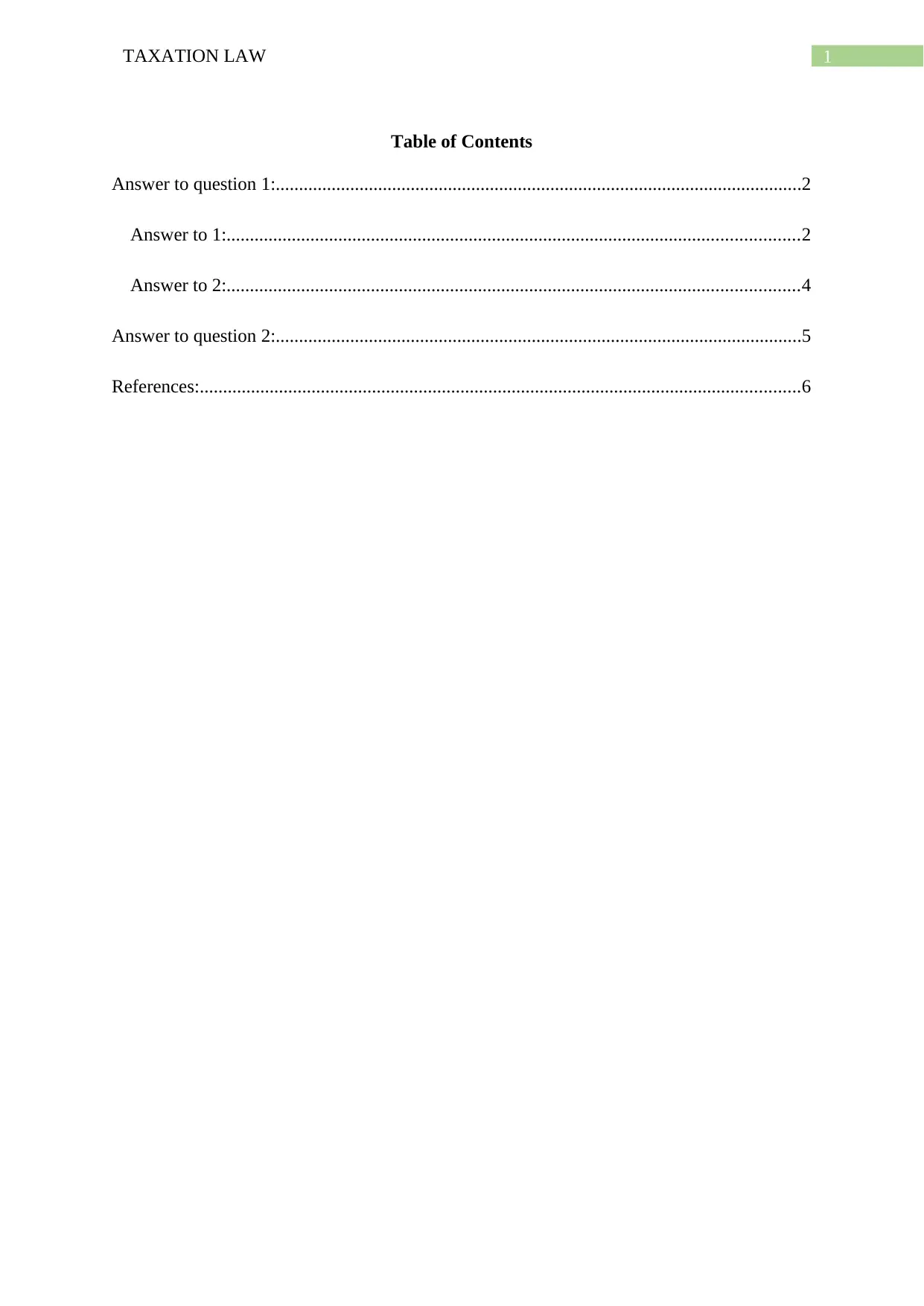
1TAXATION LAW
Table of Contents
Answer to question 1:.................................................................................................................2
Answer to 1:...........................................................................................................................2
Answer to 2:...........................................................................................................................4
Answer to question 2:.................................................................................................................5
References:.................................................................................................................................6
Table of Contents
Answer to question 1:.................................................................................................................2
Answer to 1:...........................................................................................................................2
Answer to 2:...........................................................................................................................4
Answer to question 2:.................................................................................................................5
References:.................................................................................................................................6
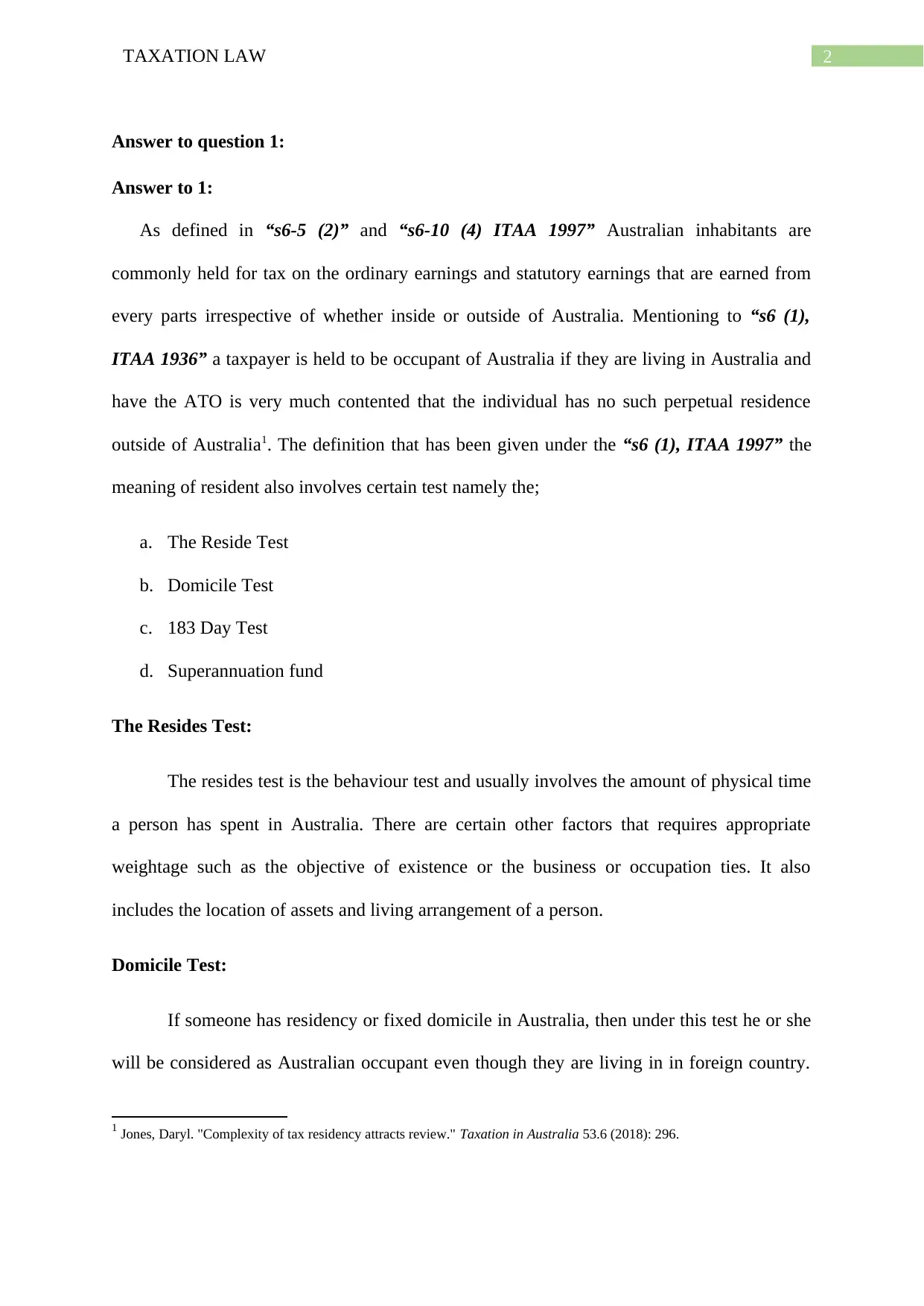
2TAXATION LAW
Answer to question 1:
Answer to 1:
As defined in “s6-5 (2)” and “s6-10 (4) ITAA 1997” Australian inhabitants are
commonly held for tax on the ordinary earnings and statutory earnings that are earned from
every parts irrespective of whether inside or outside of Australia. Mentioning to “s6 (1),
ITAA 1936” a taxpayer is held to be occupant of Australia if they are living in Australia and
have the ATO is very much contented that the individual has no such perpetual residence
outside of Australia1. The definition that has been given under the “s6 (1), ITAA 1997” the
meaning of resident also involves certain test namely the;
a. The Reside Test
b. Domicile Test
c. 183 Day Test
d. Superannuation fund
The Resides Test:
The resides test is the behaviour test and usually involves the amount of physical time
a person has spent in Australia. There are certain other factors that requires appropriate
weightage such as the objective of existence or the business or occupation ties. It also
includes the location of assets and living arrangement of a person.
Domicile Test:
If someone has residency or fixed domicile in Australia, then under this test he or she
will be considered as Australian occupant even though they are living in in foreign country.
1 Jones, Daryl. "Complexity of tax residency attracts review." Taxation in Australia 53.6 (2018): 296.
Answer to question 1:
Answer to 1:
As defined in “s6-5 (2)” and “s6-10 (4) ITAA 1997” Australian inhabitants are
commonly held for tax on the ordinary earnings and statutory earnings that are earned from
every parts irrespective of whether inside or outside of Australia. Mentioning to “s6 (1),
ITAA 1936” a taxpayer is held to be occupant of Australia if they are living in Australia and
have the ATO is very much contented that the individual has no such perpetual residence
outside of Australia1. The definition that has been given under the “s6 (1), ITAA 1997” the
meaning of resident also involves certain test namely the;
a. The Reside Test
b. Domicile Test
c. 183 Day Test
d. Superannuation fund
The Resides Test:
The resides test is the behaviour test and usually involves the amount of physical time
a person has spent in Australia. There are certain other factors that requires appropriate
weightage such as the objective of existence or the business or occupation ties. It also
includes the location of assets and living arrangement of a person.
Domicile Test:
If someone has residency or fixed domicile in Australia, then under this test he or she
will be considered as Australian occupant even though they are living in in foreign country.
1 Jones, Daryl. "Complexity of tax residency attracts review." Taxation in Australia 53.6 (2018): 296.
⊘ This is a preview!⊘
Do you want full access?
Subscribe today to unlock all pages.

Trusted by 1+ million students worldwide
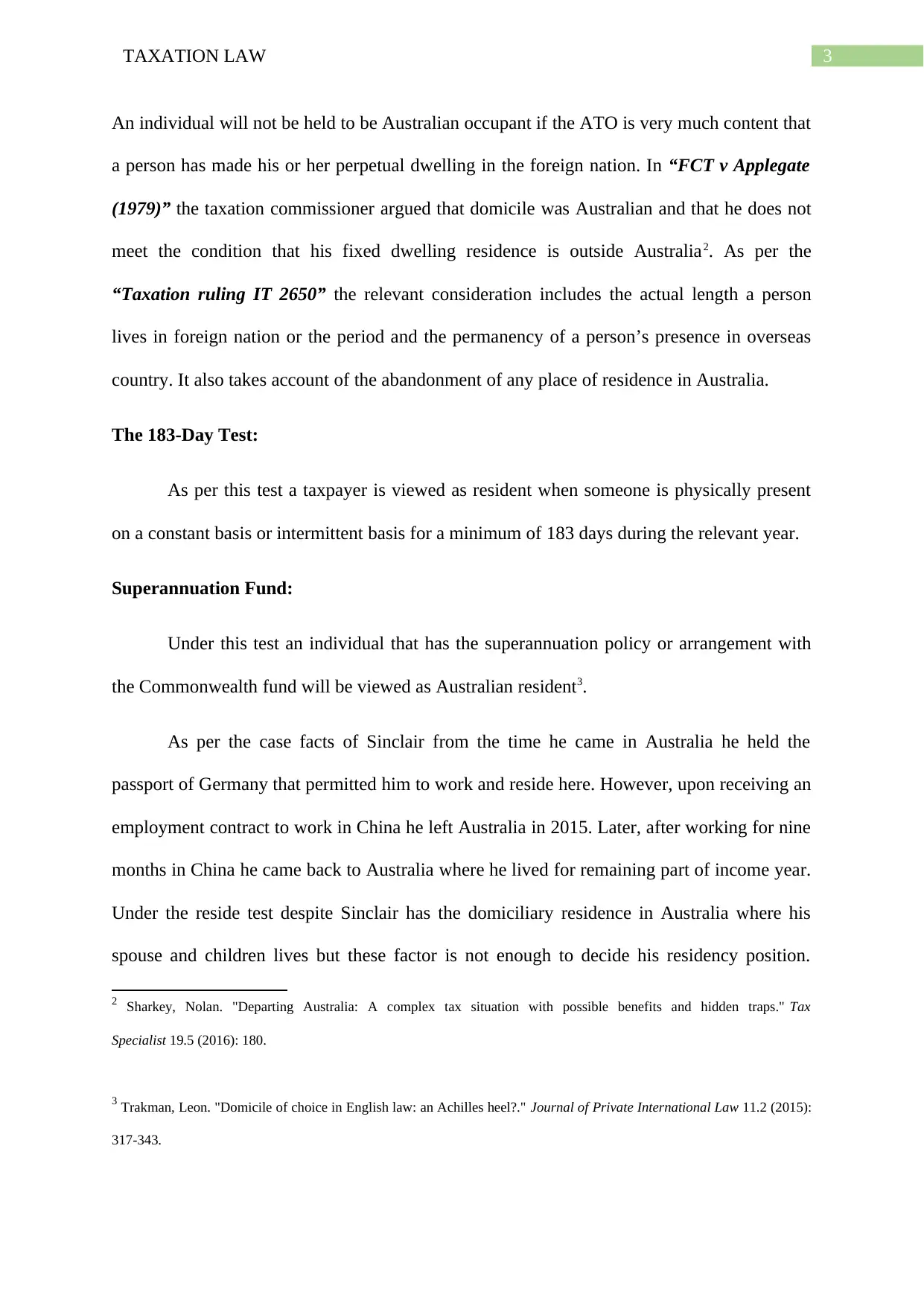
3TAXATION LAW
An individual will not be held to be Australian occupant if the ATO is very much content that
a person has made his or her perpetual dwelling in the foreign nation. In “FCT v Applegate
(1979)” the taxation commissioner argued that domicile was Australian and that he does not
meet the condition that his fixed dwelling residence is outside Australia2. As per the
“Taxation ruling IT 2650” the relevant consideration includes the actual length a person
lives in foreign nation or the period and the permanency of a person’s presence in overseas
country. It also takes account of the abandonment of any place of residence in Australia.
The 183-Day Test:
As per this test a taxpayer is viewed as resident when someone is physically present
on a constant basis or intermittent basis for a minimum of 183 days during the relevant year.
Superannuation Fund:
Under this test an individual that has the superannuation policy or arrangement with
the Commonwealth fund will be viewed as Australian resident3.
As per the case facts of Sinclair from the time he came in Australia he held the
passport of Germany that permitted him to work and reside here. However, upon receiving an
employment contract to work in China he left Australia in 2015. Later, after working for nine
months in China he came back to Australia where he lived for remaining part of income year.
Under the reside test despite Sinclair has the domiciliary residence in Australia where his
spouse and children lives but these factor is not enough to decide his residency position.
2 Sharkey, Nolan. "Departing Australia: A complex tax situation with possible benefits and hidden traps." Tax
Specialist 19.5 (2016): 180.
3 Trakman, Leon. "Domicile of choice in English law: an Achilles heel?." Journal of Private International Law 11.2 (2015):
317-343.
An individual will not be held to be Australian occupant if the ATO is very much content that
a person has made his or her perpetual dwelling in the foreign nation. In “FCT v Applegate
(1979)” the taxation commissioner argued that domicile was Australian and that he does not
meet the condition that his fixed dwelling residence is outside Australia2. As per the
“Taxation ruling IT 2650” the relevant consideration includes the actual length a person
lives in foreign nation or the period and the permanency of a person’s presence in overseas
country. It also takes account of the abandonment of any place of residence in Australia.
The 183-Day Test:
As per this test a taxpayer is viewed as resident when someone is physically present
on a constant basis or intermittent basis for a minimum of 183 days during the relevant year.
Superannuation Fund:
Under this test an individual that has the superannuation policy or arrangement with
the Commonwealth fund will be viewed as Australian resident3.
As per the case facts of Sinclair from the time he came in Australia he held the
passport of Germany that permitted him to work and reside here. However, upon receiving an
employment contract to work in China he left Australia in 2015. Later, after working for nine
months in China he came back to Australia where he lived for remaining part of income year.
Under the reside test despite Sinclair has the domiciliary residence in Australia where his
spouse and children lives but these factor is not enough to decide his residency position.
2 Sharkey, Nolan. "Departing Australia: A complex tax situation with possible benefits and hidden traps." Tax
Specialist 19.5 (2016): 180.
3 Trakman, Leon. "Domicile of choice in English law: an Achilles heel?." Journal of Private International Law 11.2 (2015):
317-343.
Paraphrase This Document
Need a fresh take? Get an instant paraphrase of this document with our AI Paraphraser
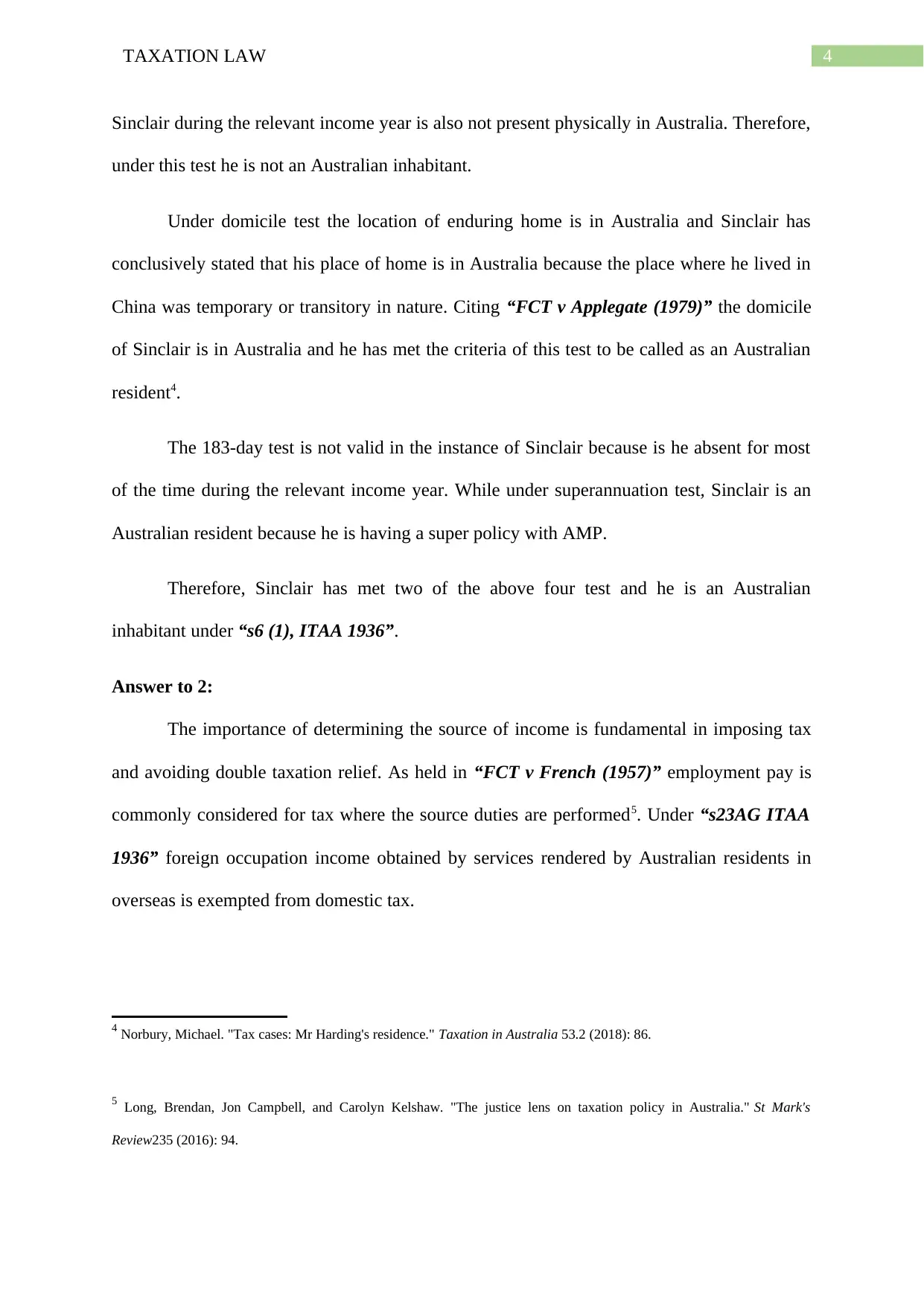
4TAXATION LAW
Sinclair during the relevant income year is also not present physically in Australia. Therefore,
under this test he is not an Australian inhabitant.
Under domicile test the location of enduring home is in Australia and Sinclair has
conclusively stated that his place of home is in Australia because the place where he lived in
China was temporary or transitory in nature. Citing “FCT v Applegate (1979)” the domicile
of Sinclair is in Australia and he has met the criteria of this test to be called as an Australian
resident4.
The 183-day test is not valid in the instance of Sinclair because is he absent for most
of the time during the relevant income year. While under superannuation test, Sinclair is an
Australian resident because he is having a super policy with AMP.
Therefore, Sinclair has met two of the above four test and he is an Australian
inhabitant under “s6 (1), ITAA 1936”.
Answer to 2:
The importance of determining the source of income is fundamental in imposing tax
and avoiding double taxation relief. As held in “FCT v French (1957)” employment pay is
commonly considered for tax where the source duties are performed5. Under “s23AG ITAA
1936” foreign occupation income obtained by services rendered by Australian residents in
overseas is exempted from domestic tax.
4 Norbury, Michael. "Tax cases: Mr Harding's residence." Taxation in Australia 53.2 (2018): 86.
5 Long, Brendan, Jon Campbell, and Carolyn Kelshaw. "The justice lens on taxation policy in Australia." St Mark's
Review235 (2016): 94.
Sinclair during the relevant income year is also not present physically in Australia. Therefore,
under this test he is not an Australian inhabitant.
Under domicile test the location of enduring home is in Australia and Sinclair has
conclusively stated that his place of home is in Australia because the place where he lived in
China was temporary or transitory in nature. Citing “FCT v Applegate (1979)” the domicile
of Sinclair is in Australia and he has met the criteria of this test to be called as an Australian
resident4.
The 183-day test is not valid in the instance of Sinclair because is he absent for most
of the time during the relevant income year. While under superannuation test, Sinclair is an
Australian resident because he is having a super policy with AMP.
Therefore, Sinclair has met two of the above four test and he is an Australian
inhabitant under “s6 (1), ITAA 1936”.
Answer to 2:
The importance of determining the source of income is fundamental in imposing tax
and avoiding double taxation relief. As held in “FCT v French (1957)” employment pay is
commonly considered for tax where the source duties are performed5. Under “s23AG ITAA
1936” foreign occupation income obtained by services rendered by Australian residents in
overseas is exempted from domestic tax.
4 Norbury, Michael. "Tax cases: Mr Harding's residence." Taxation in Australia 53.2 (2018): 86.
5 Long, Brendan, Jon Campbell, and Carolyn Kelshaw. "The justice lens on taxation policy in Australia." St Mark's
Review235 (2016): 94.
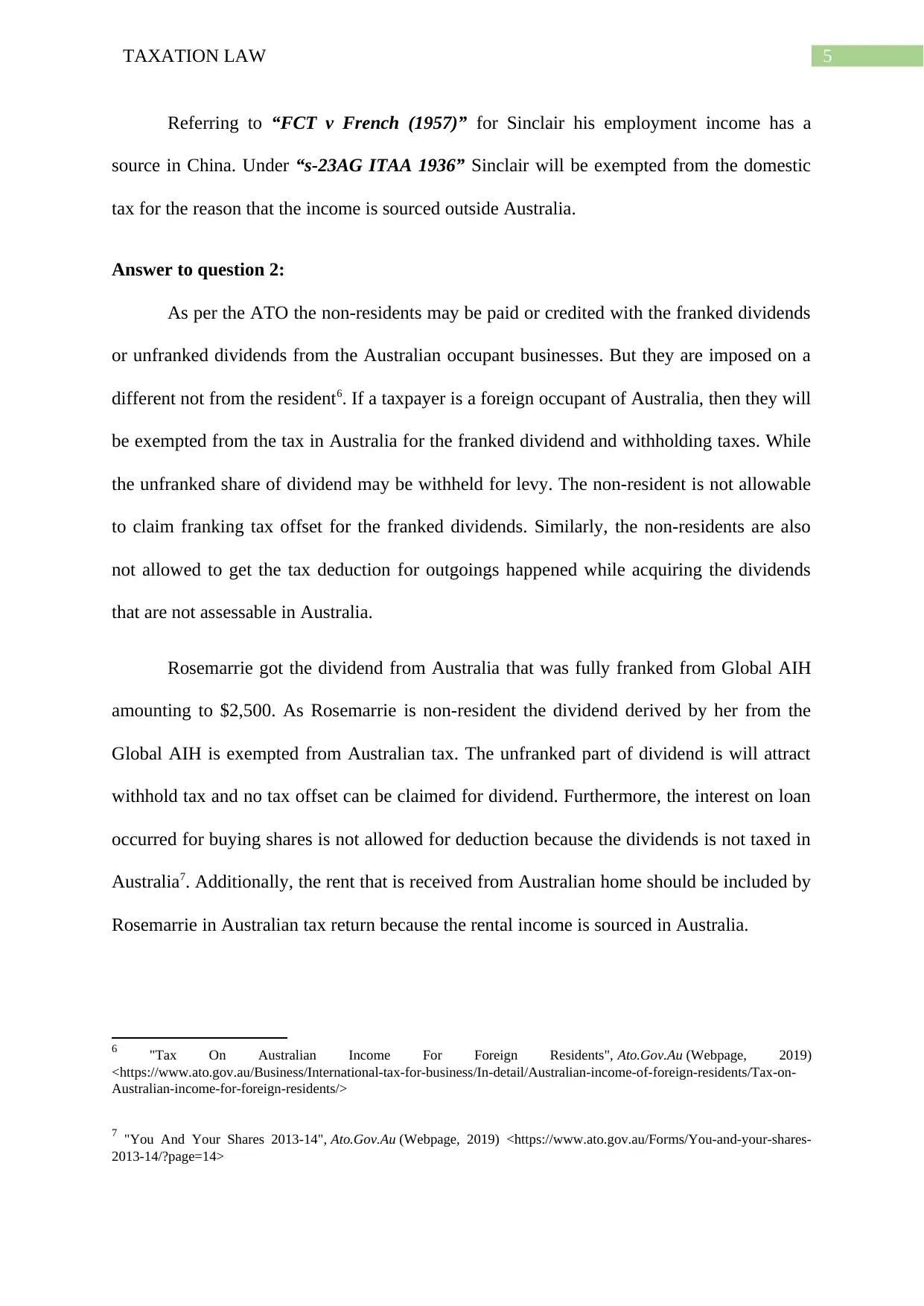
5TAXATION LAW
Referring to “FCT v French (1957)” for Sinclair his employment income has a
source in China. Under “s-23AG ITAA 1936” Sinclair will be exempted from the domestic
tax for the reason that the income is sourced outside Australia.
Answer to question 2:
As per the ATO the non-residents may be paid or credited with the franked dividends
or unfranked dividends from the Australian occupant businesses. But they are imposed on a
different not from the resident6. If a taxpayer is a foreign occupant of Australia, then they will
be exempted from the tax in Australia for the franked dividend and withholding taxes. While
the unfranked share of dividend may be withheld for levy. The non-resident is not allowable
to claim franking tax offset for the franked dividends. Similarly, the non-residents are also
not allowed to get the tax deduction for outgoings happened while acquiring the dividends
that are not assessable in Australia.
Rosemarrie got the dividend from Australia that was fully franked from Global AIH
amounting to $2,500. As Rosemarrie is non-resident the dividend derived by her from the
Global AIH is exempted from Australian tax. The unfranked part of dividend is will attract
withhold tax and no tax offset can be claimed for dividend. Furthermore, the interest on loan
occurred for buying shares is not allowed for deduction because the dividends is not taxed in
Australia7. Additionally, the rent that is received from Australian home should be included by
Rosemarrie in Australian tax return because the rental income is sourced in Australia.
6 "Tax On Australian Income For Foreign Residents", Ato.Gov.Au (Webpage, 2019)
<https://www.ato.gov.au/Business/International-tax-for-business/In-detail/Australian-income-of-foreign-residents/Tax-on-
Australian-income-for-foreign-residents/>
7 "You And Your Shares 2013-14", Ato.Gov.Au (Webpage, 2019) <https://www.ato.gov.au/Forms/You-and-your-shares-
2013-14/?page=14>
Referring to “FCT v French (1957)” for Sinclair his employment income has a
source in China. Under “s-23AG ITAA 1936” Sinclair will be exempted from the domestic
tax for the reason that the income is sourced outside Australia.
Answer to question 2:
As per the ATO the non-residents may be paid or credited with the franked dividends
or unfranked dividends from the Australian occupant businesses. But they are imposed on a
different not from the resident6. If a taxpayer is a foreign occupant of Australia, then they will
be exempted from the tax in Australia for the franked dividend and withholding taxes. While
the unfranked share of dividend may be withheld for levy. The non-resident is not allowable
to claim franking tax offset for the franked dividends. Similarly, the non-residents are also
not allowed to get the tax deduction for outgoings happened while acquiring the dividends
that are not assessable in Australia.
Rosemarrie got the dividend from Australia that was fully franked from Global AIH
amounting to $2,500. As Rosemarrie is non-resident the dividend derived by her from the
Global AIH is exempted from Australian tax. The unfranked part of dividend is will attract
withhold tax and no tax offset can be claimed for dividend. Furthermore, the interest on loan
occurred for buying shares is not allowed for deduction because the dividends is not taxed in
Australia7. Additionally, the rent that is received from Australian home should be included by
Rosemarrie in Australian tax return because the rental income is sourced in Australia.
6 "Tax On Australian Income For Foreign Residents", Ato.Gov.Au (Webpage, 2019)
<https://www.ato.gov.au/Business/International-tax-for-business/In-detail/Australian-income-of-foreign-residents/Tax-on-
Australian-income-for-foreign-residents/>
7 "You And Your Shares 2013-14", Ato.Gov.Au (Webpage, 2019) <https://www.ato.gov.au/Forms/You-and-your-shares-
2013-14/?page=14>
⊘ This is a preview!⊘
Do you want full access?
Subscribe today to unlock all pages.

Trusted by 1+ million students worldwide
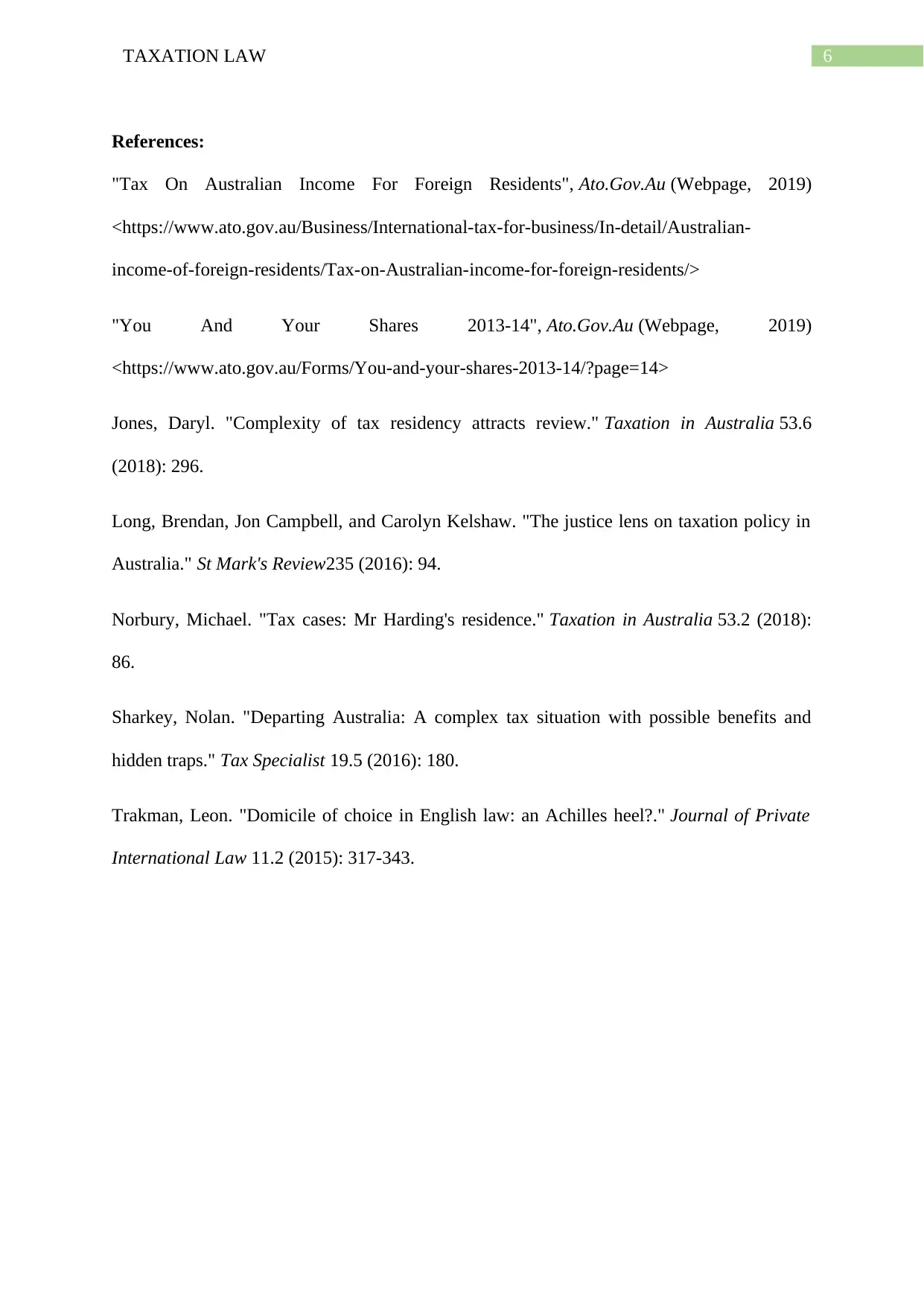
6TAXATION LAW
References:
"Tax On Australian Income For Foreign Residents", Ato.Gov.Au (Webpage, 2019)
<https://www.ato.gov.au/Business/International-tax-for-business/In-detail/Australian-
income-of-foreign-residents/Tax-on-Australian-income-for-foreign-residents/>
"You And Your Shares 2013-14", Ato.Gov.Au (Webpage, 2019)
<https://www.ato.gov.au/Forms/You-and-your-shares-2013-14/?page=14>
Jones, Daryl. "Complexity of tax residency attracts review." Taxation in Australia 53.6
(2018): 296.
Long, Brendan, Jon Campbell, and Carolyn Kelshaw. "The justice lens on taxation policy in
Australia." St Mark's Review235 (2016): 94.
Norbury, Michael. "Tax cases: Mr Harding's residence." Taxation in Australia 53.2 (2018):
86.
Sharkey, Nolan. "Departing Australia: A complex tax situation with possible benefits and
hidden traps." Tax Specialist 19.5 (2016): 180.
Trakman, Leon. "Domicile of choice in English law: an Achilles heel?." Journal of Private
International Law 11.2 (2015): 317-343.
References:
"Tax On Australian Income For Foreign Residents", Ato.Gov.Au (Webpage, 2019)
<https://www.ato.gov.au/Business/International-tax-for-business/In-detail/Australian-
income-of-foreign-residents/Tax-on-Australian-income-for-foreign-residents/>
"You And Your Shares 2013-14", Ato.Gov.Au (Webpage, 2019)
<https://www.ato.gov.au/Forms/You-and-your-shares-2013-14/?page=14>
Jones, Daryl. "Complexity of tax residency attracts review." Taxation in Australia 53.6
(2018): 296.
Long, Brendan, Jon Campbell, and Carolyn Kelshaw. "The justice lens on taxation policy in
Australia." St Mark's Review235 (2016): 94.
Norbury, Michael. "Tax cases: Mr Harding's residence." Taxation in Australia 53.2 (2018):
86.
Sharkey, Nolan. "Departing Australia: A complex tax situation with possible benefits and
hidden traps." Tax Specialist 19.5 (2016): 180.
Trakman, Leon. "Domicile of choice in English law: an Achilles heel?." Journal of Private
International Law 11.2 (2015): 317-343.
1 out of 7
Related Documents
Your All-in-One AI-Powered Toolkit for Academic Success.
+13062052269
info@desklib.com
Available 24*7 on WhatsApp / Email
![[object Object]](/_next/static/media/star-bottom.7253800d.svg)
Unlock your academic potential
Copyright © 2020–2026 A2Z Services. All Rights Reserved. Developed and managed by ZUCOL.





